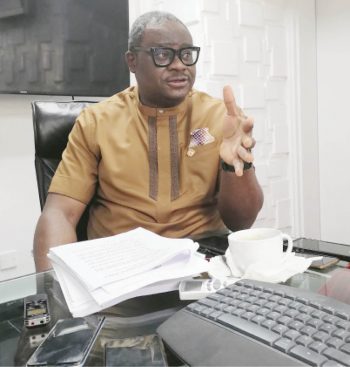Mr. Kola Adesina is the Group Managing Director, Sahara Power Group, the operator of Egbin Power and Ikeja Electric both in Lagos State. In this interview, the industry top player speaks about managing the assets in the last six years after privatization and the huge potential the sector holds for Nigeria’s sustainable growth.
What should power operators do for Nigerian consumers to enjoy constant power supply?
For everybody to have electricity in a stable, in a regular, in a productive manner, we require to generate, to transmit and distribute 26,000MW megawatts (MW) as at today. Now you go into the different alternatives of generating electricity, it is either you want to use the hydro or to use the thermal. You then go to transmission aspect and ask if there is transmission infrastructure to transmit 26,000MW. The answer of course is no! So, the question is how do you rapidly build a transmission infrastructure to be able to take 26,000MW from the various generating plants and ultimately take it to the Distribution Companies (DisCos)? At the DisCos level, you ask what is it that they require to take it to our various customers. It starts with the customer, it ends with the customer. Now that customer must be able to pay for that capacity he has received and once he pays, the entire value chain is able to be made whole again so that they can consistently continue to give power to everybody in that chain. So, there is a need for an integrated solution where everybody in the value chain truly comes up with their own requirement for success in order to make it work.
What about some consumers that can’t afford to pay cost reflective tariff?
There are different schools of thoughts regarding the capacity to pay. I have a very middle-of-the-road approach to it and incidentally at the point of privatisation, government equally had a similar view. What they did was that for those who can pay, government said they would give to those of us in the business a cost reflective tariff. But for those who can’t pay, there is a N100 billion power consumer fund to cushion the gap between what government expected from the lowest in the economic rung and what is required for them to pay, and government will pay that to the DisCos. Also, for those who say they can’t afford cost reflective tariff, you go to our homes today, you see generators, both diesel and petrol and you look at the cost of the acquisition of the generator, of paying for diesel and fuel, you will discover that it is so far more expensive than energy from the utility.
What should consumers do to ensure steady supply?
What is required really is that if you, (consumer) want steady electricity, pay for it, then hold us accountable for none performance. The current set of regulators, I must praise them for the Yeoman’s job they have done. They have done incredibly well, that is the current set of regulators. They can do better because that is where regulators now come in to say I have given you cost reflective tariff, you are charging that cost reflective tariff, this is the level of performance and supply I need to see. For failure, there are penalties and that is all. That is the way it works. But if you say that the meters should be provided first, it is going to come from somewhere. Now, the enabler required for metering has not being provided as yet, that is an appropriate pricing.
Recently the federal government unveiled an intervention for the power sector by Siemens. Did they get the DisCos’ buy-in before rolling it out?
I will want to salute the Federal Government for the Siemens initiative and the reason being that just like you rightly observed, it is meant to close the technical gap in the system. So, we are very much aligned with the government on the Siemens initiative. Government has signed a MoU and we are trying to activate it. The proposition from government is that it is going to be 60 – 40, government will take a loan and that government will pay their own 40% and they would expect that we would come up as a business to pay our own 60%. Some of the unaligned argument is simply put from our own side, is that government has been a shareholder for six years, we have not seen anything from government so when are we going to get that? So maybe this is part of what we need to use to close the gap.

